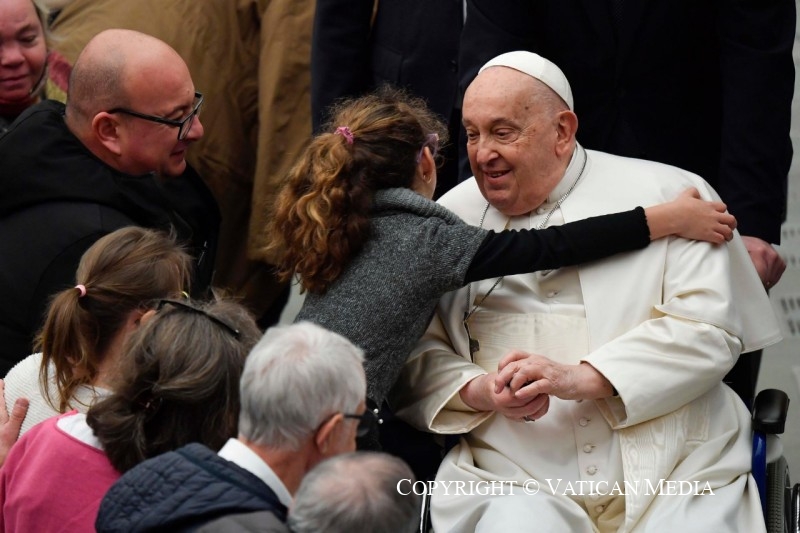Pope starts a new cycle of catechesis on the Holy Spirit
In today’s general audience in St Peter's Square, the pontiff kicked off a new round of reflections, this time on the action of the Holy Spirit in the history of salvation. “The Spirit is harmony," Francis explained. He also talked about the "havoc" humanity is visiting upon Creation, as well as how to undertake the "way of contemplation" like Francis of Assisi. The Holy Father spoke about the victims of a landslide in Papua New Guinea. Turning to Ukraine, Palestine, and Myanmar, he said “War is always cruel.”
Vatican City (AsiaNews) – Pope Francis expressed closeness to the people affected by a devastating landslide in Enga, a province in Papua New Guinea, which buried more than 2,000 people according to UN estimates, on 23-24 May, urging the faithful to turn their thoughts to the victims.
“I want to offer assurance of my prayers for the victims of the great landslide that swept through some villages in Papua New Guinea,” the pontiff said at the end of today’s Wednesday general audience in St. Peter's Square.
In September, the pontiff is set to visit that country, part of a trip to Southeast Asia as well.
As he usually does, Pope Francis mentioned countries at war (“My thoughts go to tormented Ukraine"), but also the meeting in Rome last weekend with boys and girls suffering the consequences of violence, for the first World Children's Day.
“The other day I received little boys and girls who suffered burns, they lost their legs in the war: war is always cruel,” he said. Even children who are starting to walk again, even with the help of artificial limbs, "have lost their smiles".
“And let us not forget Palestine and Israel who suffer so much: let the war end. And let us not forget Myanmar. [. . .] Let us pray to the Lord to be close to all and give us the grace of peace,” he said.
During his address, the Holy Father also mentioned Fr Giuseppe Rossi, a priest and martyr who was beatified in Novara (Italy) on Sunday, a “zealous parish priest of charity,” who “did not abandon the flock during the tragic period of World War II but defended it even to the shedding of his blood. May his heroic witness help us to face the trials of life with fortitude.” A round of applause followed.
The pontffi spoke to the faithful in St Peter's Square about the Solemnity of Saint Paul VI, which is celebrated today. “May this anniversary help everyone to rediscover the joy of being Christian, inspiring a renewed commitment to building the civilisation of love. And please, if you have some time, read Paul VI's letter ‘Evangelii nuntiandi,’ which is still relevant today.”
Last week, Francis ended the cycle of catechesis on "Vices and Virtues”. Today, he started a new cycle dedicated to “‘The Holy Spirit and the Bride” – the bride is the Church – “The Holy Spirit guides God's people towards Jesus our hope’.”
His reflection focused on The Spirit of God was hovering over the face of the waters’ (Gen 1:1-2), the beginning of a journey that will continue “through the three great stages of salvation history: the Old Testament, the New Testament, and the time of the Church.”
His thoughts will be shared in the coming weeks at the Wednesday general audiences, focusing first on discovering “what is given as a promise in the Old Testament” and “fully realised in Christ.”
Today's reflection started with the first verses of Genesis. “In the beginning, God created the heavens and the earth. The earth was without form and void, and darkness was over the face of the deep. And the Spirit of God was hovering over the face of the waters’ (Gen 1:1-2).
“The Spirit of God appears to us here as the mysterious power that moves the world from its initial formless, deserted, and gloomy state to its ordered and harmonious state,” explained the Holy Father.
The Spirit thus allows the transformation of chaos into harmony, an action that after Creation “becomes more precise in the following revelation” as is evinced on several occasions in the New Testament.
However, the Apostle Paul introduces a new element to the relationship between the Spirit and Creation. “He speaks of a universe that ‘groans and suffers as in labour pains’ (cf. Rom 8:22), something that “concerns us dramatically.”
Creation is suffering because of the “corruption and sin of humanity that has dragged it into its alienation from God,” Francis said. “We see the havoc that has been done, and that continues to be wrought upon creation by humanity, especially that part of it that has greater capacity to exploit its resources.”
Francis of Assisi offers a way out of this "havoc" with his Canticle of the Creatures, “the way of contemplation and praise. [. . .] It is to put the joy of contemplating ahead of the joy of possessing,” Francis said, “because the Spirit is harmony.”
Turning to the meaning of chaos, Francis noties that it can be external and internal, mirroring each other.
The first is “social chaos, political chaos. We think about wars, we think about so many boys and girls who don’t have enough to eat, about so many social injustices.”
According to the pontiff, it is impossible to transform this into harmony, if we do not first act on the former.
“[L]et us do a good job of making our internal confusion a clarity of the Holy Spirit. It is the power of God that does this, and we open our hearts so that He can do it,” he noted.
Finally, “Let us ask the Holy Spirit to come to us and make us new persons, with the newness of the Spirit.”







.png)










